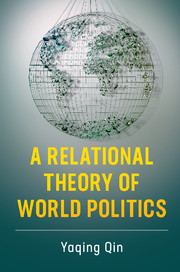Book contents
- A Relational Theory of World Politics
- A Relational Theory of World Politics
- Copyright page
- Contents
- Figures
- Tables
- Preface
- Acknowledgments
- Part I Culture and Social Theory
- Part II Relation and Relationality
- 5 A World of Relations
- 6 Meta-relationship and the Zhongyong Dialectics
- 7 The Logic of Relationality
- Part III Power, Cooperation, and Governance
- Bibliography
- Index
6 - Meta-relationship and the Zhongyong Dialectics
from Part II - Relation and Relationality
Published online by Cambridge University Press: 03 April 2018
- A Relational Theory of World Politics
- A Relational Theory of World Politics
- Copyright page
- Contents
- Figures
- Tables
- Preface
- Acknowledgments
- Part I Culture and Social Theory
- Part II Relation and Relationality
- 5 A World of Relations
- 6 Meta-relationship and the Zhongyong Dialectics
- 7 The Logic of Relationality
- Part III Power, Cooperation, and Governance
- Bibliography
- Index
Summary
- Type
- Chapter
- Information
- A Relational Theory of World Politics , pp. 152 - 194Publisher: Cambridge University PressPrint publication year: 2018



